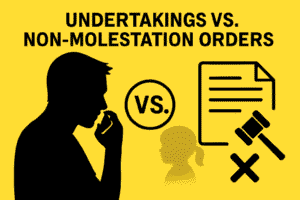Growing up without a father is more than just an empty chair at the dinner table. For many children, the absence of a dad leaves deep emotional and developmental scars that can last into adulthood. As a father, reading about “absent father effects” can feel raw and overwhelming – especially if you’ve been pushed out of your child’s life or unfairly painted as absent in court.
The good news: while the research shows clear risks, those outcomes are not inevitable. With the right support and legal steps, fathers can repair relationships and give their children the stability they need.
🔑 Key Takeaways
- Father absence affects boys and girls differently – with daughters often facing emotional struggles in adolescence and sons experiencing mental health challenges later in adulthood.
- Timing matters – absence in early childhood carries the highest risk for long-term difficulties.
- Impacts are wide-ranging – from lower self-esteem and behavioural problems to poorer academic performance and adult relationship difficulties.
- Context is critical – not every child without daily contact suffers; quality of father involvement matters as much as quantity.
- There are solutions – fathers can take legal steps to re-establish contact, prepare effectively for CAFCASS assessments, and ensure the court sees their commitment to their children.
Worried about being painted as an “absent” father? Message us on WhatsApp for expert guidance on proving your commitment in court.
Psychological Effects of Father Absence
Children without consistent contact with their father often report feelings of abandonment, confusion, and low self-worth. Research links father absence to higher rates of anxiety, depression, and difficulty regulating emotions well into adulthood.
These effects don’t always show immediately. Some children mask their feelings, while others act out. Over time, unresolved grief or anger about a father’s absence can manifest as self-esteem issues, trust problems, or difficulties forming healthy relationships.
Effects on Sons
Boys raised without a father figure often struggle with:
- Role modelling: without a positive male example, boys may feel unsure about identity and masculinity.
- Behavioural issues: higher risk of aggression, rule-breaking, or seeking belonging in unhealthy peer groups.
- Delayed emotional maturity: some research shows that sons of absent fathers may experience a spike in depression or mental health challenges in early adulthood, even if they seemed “fine” as teenagers.
👉 If you’re a father being excluded from your son’s life, addressing this early matters. Courts recognise the importance of fathers in providing stability, and there are legal steps to restore contact. See our page on Professional Support for Child Arrangements Orders.
Need tailored advice for reconnecting with your son? Chat with us on WhatsApp — we’ll help you prepare the right legal steps.
Effects on Daughters
For girls, father absence often shows up differently:
- Emotional vulnerability: higher risk of anxiety, depression, and low self-worth, especially during adolescence.
- Relationship patterns: daughters without a stable father figure may seek approval from older men or struggle with boundaries in relationships.
- Earlier life stress: studies suggest father absence in early childhood is linked to earlier puberty and greater vulnerability during teenage years.
👉 For dads of daughters, even small amounts of consistent, positive contact can make a huge difference. If you’re struggling to get back into your child’s life, consider booking MIAM Mediation Support as a first step.
Fighting to stay in your daughter’s life? WhatsApp us today for strategic support with mediation and court preparation.
Impact on Child Development
Beyond emotional wellbeing, father absence affects children’s academic, social, and physical health:
- Lower academic performance and higher school dropout rates.
- Increased risk of involvement in crime or substance abuse.
- Greater likelihood of poverty and economic hardship.
- Physical health issues such as stress-related illnesses or chronic conditions.
Importantly, it’s not the absence alone but the loss of consistent guidance and support that creates risk. Children with non-resident fathers who stay positively involved tend to do far better than those with little or no contact.
Early vs Later Childhood Absence
Timing makes a big difference. UK research shows:
- Early absence (birth to 5 years): strongest link to depression and emotional struggles later in life.
- Later absence (ages 5–10): still harmful, but effects are often less severe – especially if strong bonds were formed early.
This means fathers fighting for contact when their children are young are fighting a battle with long-term stakes. Courts are aware of this research and recognise the importance of early father involvement.
How Courts and Social Workers View Father Absence
As someone who used to write Section 7 reports for CAFCASS, I can tell you this: father absence is never judged in isolation. Social workers and judges look at:
- Why contact has broken down – voluntary absence vs being pushed out.
- Evidence of effort – did the father try mediation, apply to court, write a position statement?
- Impact on the child – is there evidence the child is missing out emotionally, socially, or developmentally?
👉 This is where strategic preparation matters. If you’re being painted as “absent,” a well-prepared Position Statement can make clear to the court the reality of your efforts and your child’s needs.
Being unfairly labelled as absent? Send us a WhatsApp — we’ll help you frame your evidence and position statement the right way.
FAQs
Many dads search the web late at night with the same questions – trying to make sense of how father absence might affect their child and what it means for their case. Below we’ve answered some of the most common queries, combining research insights with practical guidance.
What are the psychological effects of not having a father?
Children often experience low self-esteem, anxiety, depression, and trust issues.
What happens to boys without fathers?
They may struggle with identity, masculinity, and show increased behavioural or academic difficulties.
What happens to girls without fathers?
They may become emotionally vulnerable in adolescence, with higher risk of relationship challenges and depression.
Is “absent father syndrome” real?
While not a formal diagnosis, “absent father syndrome” is a popular phrase describing the emotional and behavioural effects seen in children without father involvement.
Does it matter if the father left early or later?
Yes. Early absence (before age 5) is strongly linked to long-term emotional struggles; later absence can still have an impact but may be less severe.
Conclusion
Father absence has undeniable effects – emotionally, psychologically, and developmentally. But it’s not a life sentence for your child, nor does it define you as a dad. The reality is that many fathers labelled “absent” are fighting tooth and nail to be involved but face barriers from ex-partners or the system.
With the right preparation, guidance, and legal steps, you can re-establish contact and prove your commitment to your child’s future.
To see the full range of ways we support dads – from guidance on court forms to in-depth case strategy – visit the Dads Consultancy homepage.
🧠 Insider Insight: Lach, our founder, is a qualified social worker who used to write Section 7 reports for CAFCASS – the very reports that influence court outcomes. Now he helps dads respond to them. Learn more about Lach’s background.
👉 Learn more about how we can support you or book a free consultation today




